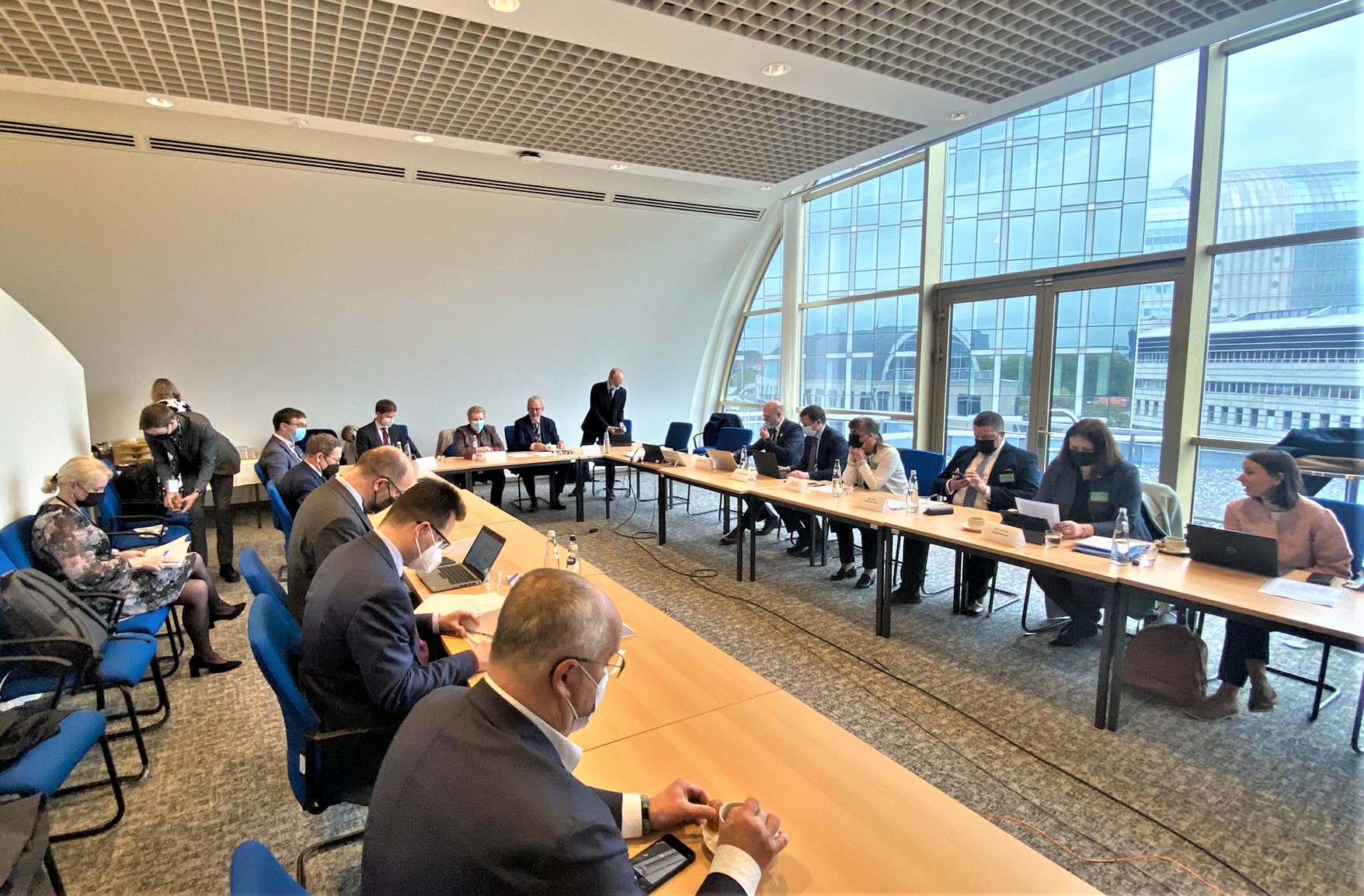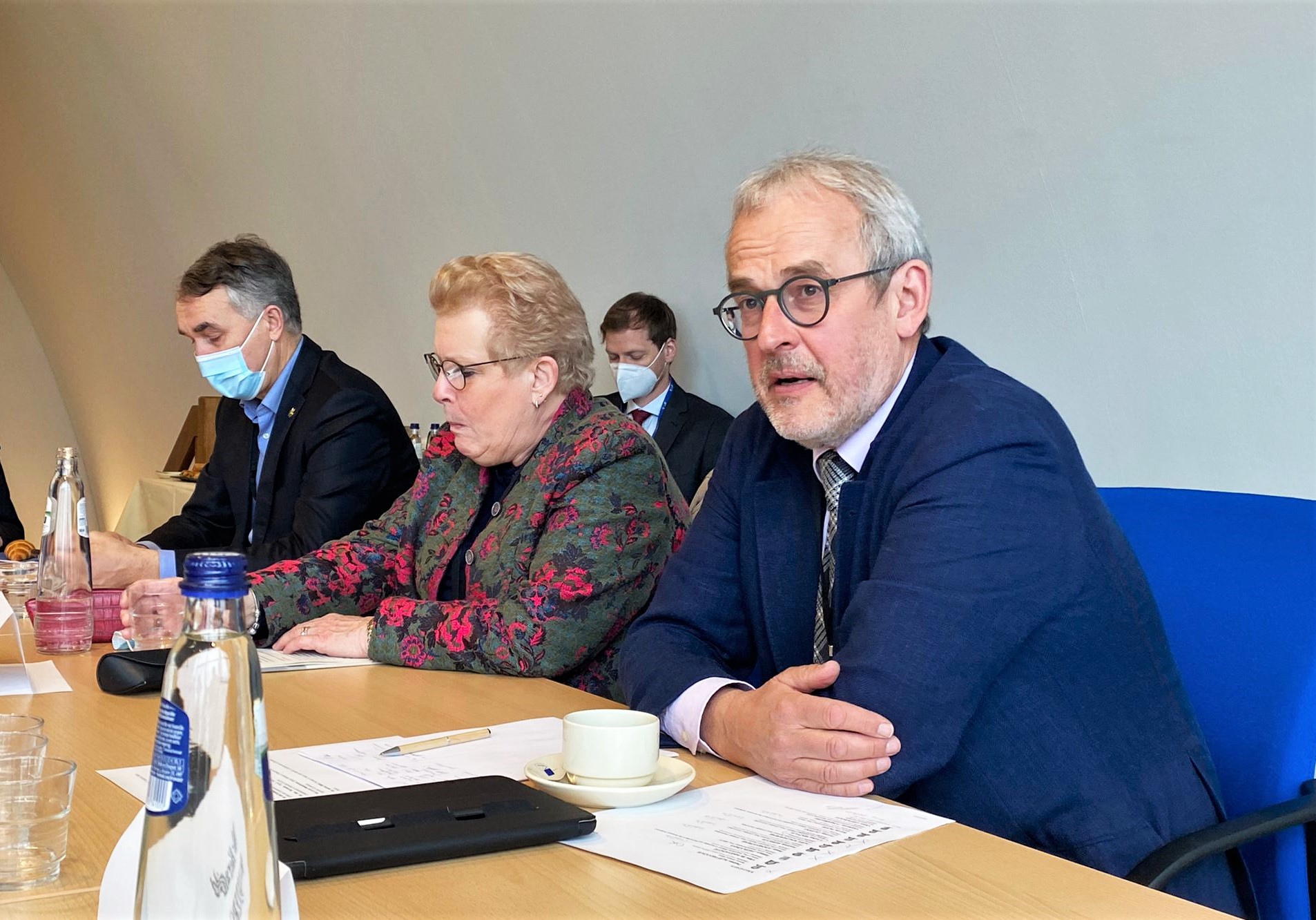
On 26 April, the implementers of the Rail Baltica project presented the progress of the future high-speed infrastructure megaproject addressing the “Friends of Rail Baltica” group, established by Members of the European Parliament and chaired by its Vice-President Dr. Roberts Zīle, also a Member of the Committee on Transport and Tourism.
The meeting had a high attendance of MEPs from all the Baltic States and Finland, and it was also attended by the North – Sea Baltic Corridor Coordinator Ms. Catherine Trautmann and Mr. Herald Ruijters, Director for Investment, Innovative & Sustainable Transport at DG MOVE. Rail Baltica project progress was presented by representatives of the Ministries of Transport of all three Baltic States: Mr. Ahti Kuningas, Deputy Secretary General at the Ministry of Economic Affairs and Communication of Estonia; Ms. Loreta Maskaliovienė, Deputy Minister of Transport and Communications of the Republic of Lithuania; Mr. Dins Merirands, Deputy State Secretary of the Ministry for Transport of Latvia; as well as Mr. Andrzej Bittel, Secretary of State of the Ministry of Infrastructure of Poland; and Ms. Sabina Lindström, Director General of the Ministry of Transport and Communications of Finland; and the principal project coordinator – the Rail Baltica Joint Venture RB Rail AS, represented by Mr. Agnis Driksna, Chairman of the Management Board and CEO and Mr. Ignas Degutis, Member of the Management Board and Chief Financial Officer.
The meeting ensured a possibility to review progress of the Rail Baltica project and to exchange views on outstanding issues requiring action at the national and EU level aimed at ensuring further acceleration and efficiency in the project’s implementation. The increasing strategic importance of the Rail Baltica global project was stressed repeatedly, especially in the current geopolitical context. This was the first meeting of the group held in person after the outbreak of the Covid-19 pandemic.

“It is a pleasure to be back in the chair of this important working group after a long break now in full presence. Several things have changed since the last time when stakeholders of all the Member States and the high-ranking Commission representatives involved met. Firstly, Russia’s aggressive war in Ukraine, despite its financial and commercial implications to the region, has demonstrated once again how important it is to see Rail Baltica as a geopolitical security project. Also, in relation to NATO enlargement, which the Finnish MEP particularly emphasized. Military mobility allocation, as a necessary part of the funding, is no longer discreetly glossed over, as in the past. Secondly, this strategic political objective must also stand up to the inevitable uncertainty of inflation forecasts. There will be challenges both in terms of changes in the supply of materials from Russia and Belarus, and in terms of possible contractors, for example in relation to China,” said Dr. Roberts Zīle, Vice-President the European Parliament.
Ms. Catherine Trautmann emphasized “Rail Baltica is not just a priority – it is an obligation. The Baltics have to be connected to the rest of Europe by all forms of transport. There are plane connections, there are road connections, but rail connections are not what they need to be. The fact, that the Baltics choose to build Rail Baltica – not as a European project but also as a tri-national project – is a very strong symbol: It is a connection of concrete and steel to the rest of Europe.”
Mr. Agnis Driksna, CEO and Chairman of the Management Board of the Rail Baltica Joint Venture outlined that “the Rail Baltica project implementation has reached significant progress in all three Baltic States and approaching start of large-scale construction. The first construction works are progressing well, including in Riga Central Hub, Riga International Airport section, on Kaunas-Lithuanian and Latvian border section and on road overpasses and eco-ducts in Estonia, but also ensuring solid progress in other strategic areas of sustainable project implementation. For example, just in the beginning of year, the Control-Command and Signalling Engineering and Works Supervision contract was signed allowing to proceed with preparations for the railway subsystems design and build procurement. Furthermore, Rail Baltica Ülemiste joint terminal construction procurement was launched as well as the design works procurement for Kaunas – Vilnius section, whereas the ambitious more than 200 km Rail Baltica main line in Latvia construction procurement is already approaching its second phase.”
“While also Rail Baltica is not immune to the general turbulences, including impacts and risks associated with the Covid-19 pandemic and Russia’s aggressive war in Ukraine, the project implementers are ready to proceed with the construction works and concluding work on technical designs. Therefore, the discussion between the key partners in the Friends of Rail Baltica format was very timely and relevant, stressing the importance and support of the Rail Baltica project in the current geopolitical context becoming stronger and more evident,” Mr. Driksna added.
The Members of the European Parliament then discussed the risks and opportunities associated with the latest developments, as well as the concrete measures that could help to implement Rail Baltica as efficiently and swiftly as possible. Among the suggestions to consider were the need to further improve the dual-use potential of the TEN-T network, as well as the need to discuss new financial measures to better address the unforeseen circumstances that are impacting the development of the railway network to provide for better flexibility in project implementation while adhering to high standards of technical interoperability and considerations of price, quality, and the speed of delivery.
